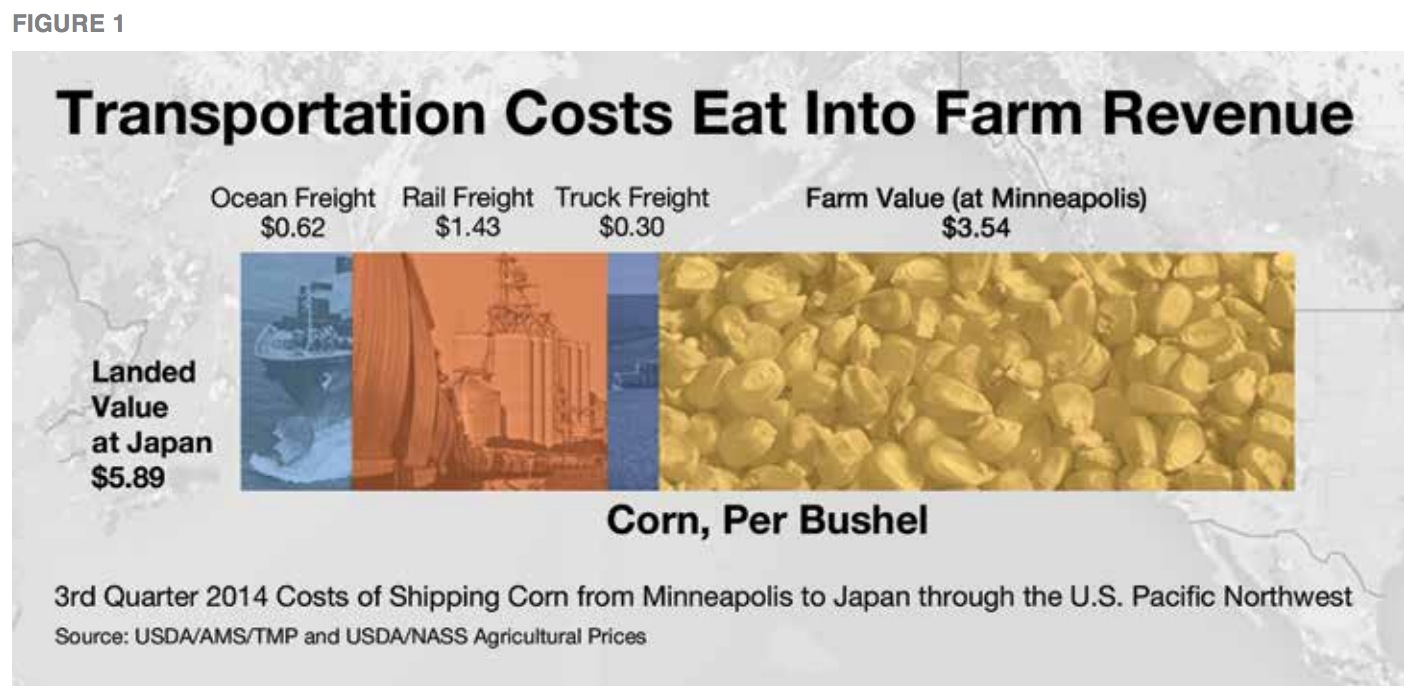AMERICAN FARM BUREAU FEDERATION
Executive Summary
Waiting three minutes for 110 train cars of oil to pass a rail crossing may just seem like one of life’s inevitable little annoyances. But as these seemingly small irritations occur with ever-increasing frequency across the United States, they have become a hallmark of the strain that plagues America’s entire freight system.
A host of commodities have all been crowding our freight infrastructure at a time when some shipping routes weren’t growing quickly enough to accommodate demand (railroad infrastructure), some shipping routes were held up by political uncertainty (pipelines), and some simply had limited physical capacity (barge shipping on the Mississippi River). Alongside larger shipments of coal and container traffic, the agriculture industry contributes to the overall congestion with its tendency to produce ever-larger record-sized harvests of grains, oilseeds, and their byproducts. But it is the surge in crude oil shipments from the Bakken formation in North Dakota that presents the most concern.
The region where rail traffic of crude oil has grown the most covers exactly the same states we think of as the Upper Midwest states – Minnesota, South Dakota, North Dakota, and Montana. As rail congestion continues to worsen, especially if the main driver of that congestion is additional crude oil traffic, grain producers in the Upper Midwest states will feel the effects.
Unfortunately, the agriculture industry is uniquely dependent on efficient rail freight systems in the hotspots most affected by congestion. Some North Dakota grain elevators, for instance, entirely rely on rail shipment to keep business flowing. Rail congestion in 2014 stopped service to them for weeks and months at a time – a total collapse in the system that supports their livelihood. Ultimately, family farmers bore the costs of scarce rail service. The USDA estimates grain and oilseed producers throughout the Upper Midwest may have received $570 million less for the crops they marketed in 2014 than they could have earned in a normal freight environment.
Elevators and farmers throughout the Corn Belt also worried about rising freight costs and the likelihood that congestion will spread and worsen. Meanwhile, end users paid more for agricultural products with less reliable delivery.
There is no question that freight volumes will continue to rise and crude oil will be transported from Canada and North Dakota to find demand points along the U.S. coasts. Our duty is to consider which alternatives for expansion of the U.S. transportation infrastructure will provide the best results for the agriculture industry while causing the least harm to communities and natural resources.
The mathematically simulated scenarios in this paper show that every expansion of any freight method — truck, rail, barge, or pipeline — can reduce overall congestion and improve the annual volume of grain moved. It’s unpredictable how freight prices would specifically respond to these expansions. Due to the nature of grain production and use, the industry is fairly inflexible about which freight methods it must use.
Therefore, opportunities for system-wide freight capacity improvement must come from other commodities, specifically from oil and industrial products, which can be channeled off the truck / rail / barge system entirely and moved into pipelines for certain routes. These are the only commodities capable of being moved by this cheaper, safer form of transportation, and pipelines are the one form of transportation that is best suited to expansion in the United States without crowding already overstressed rail terminals and highways.
Current pipeline proposals would relieve freight congestion at precisely the Upper Midwest hotspots that were most problematic for the grain industry during the 2013 and 2014 marketing years.
Download full version (PDF): Insufficient Freight
About the American Farm Bureau Federation
www.fb.org
Farm Bureau is an independent, non-governmental, voluntary organization governed by and representing farm and ranch families united for the purpose of analyzing their problems and formulating action to achieve educational improvement, economic opportunity and social advancement and, thereby, to promote the national well-being. Farm Bureau is local, county, state, national and international in its scope and influence and is non-partisan, non-sectarian and non-secret in character. Farm Bureau is the voice of agricultural producers at all levels.
Tags: agriculture, American Farm Bureau Federation, Farm, FB, Freight, Grain, Rural







 RSS Feed
RSS Feed